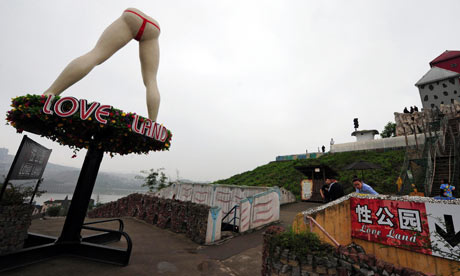Ειδικά αυτό με τα ανοιχτά πόδια και το στριγκ, πολύ με άρεσε.
Διχάζει την Κίνα το «πάρκο
του Σεξ»
Ακόμα και πριν ανοίξει τις πύλες του, το πρώτο θεματικό πάρκο για το σεξ στην Κίνα έχει προκαλέσει έντονες αντιδράσεις, κυρίως για τα μεγάλου μεγέθους γυμνά αγάλματα, τα ομοιώματα γεννητικών οργάνων, αλλά και το εργαστήρι τεχνικής για το σεξ.
"Η χώρα του έρωτα" θα αρχίσει να λειτουργεί τον Οκτώβριο στην Σονγκτσίνγκ της νοτιοδυτικής Κίνας, αλλά οι πολέμιοι του πάρκου ελπίζουν ότι αυτή η ημέρα δεν θα έρθει ποτέ, γράφει η αγγλόφωνη εφημερίδα China Daily.
Εκτός από μια έκθεση για την ιστορία της σεξουαλικότητας και τις ερωτικές τεχνικές, στο πάρκο εκτίθεται ένα τεράστιο γλυπτό που παριστάνει το κάτω μισό ενός γυναικείου σώματος σε μια στάση που, σύμφωνα με πολλούς, προκαλεί: πόδια ανοικτά και στρινγκ...Μάλιστα το γλυπτό αυτό βρίσκεται σε μια βάση που περιστρέφεται.
Ο διευθυντής του πάρκου Λου Σιαοτσίνγκ τόνισε πως "η χώρα του έρωτα" δημιουργήθηκε για το καλό του κόσμου, για να βοηθήσει τους ενήλικες να έχουν μια αρμονική σεξουαλική ζωή. "Το σεξ είναι ένα θέμα ταμπού στην Κίνα, όμως οι άνθρωποι έχουν πραγματικά ανάγκη από περισσότερες πληροφορίες για το θέμα αυτό", τόνισε ο Λου.

